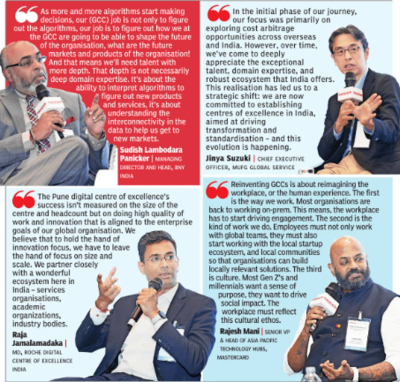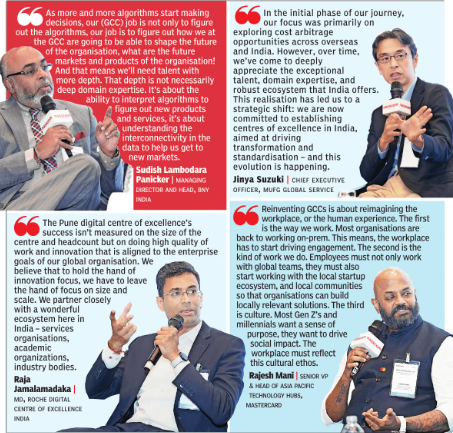ARTICLE AD BOX

After Bengaluru and Delhi-NCR, we – in partnership with Nasscom – had our third conference on building next-gen GCCs (global capability centres) last month in Mumbai. Once again, we had a panel of builders of outstanding GCCs, and one message ran through everybody’s talks: You need to continuously innovate if the GCC has to become strategically important to the parent organisation, and that requires building an entrepreneurial culture, and a culture of learning.Sudish Lambodara Panicker, MD and India head of BNY, one of the world’s largest financial services companies, said their India GCC’s biggest opportunity is to say, “how do we make sure that everybody who’s coming into work is not just thinking about how to get that work done, but thinking about how to disrupt that work…(keeping) your eyes always on the future.”Raja Jamalamadaka, MD of the digital centre of excellence in India, in Pune, for Switzerland-based pharma giant Roche, said the centre is so focused on pharma innovation that they outsource almost everything that does not fit into that mandate.
He said the centre is at the core of the future of healthcare for Roche, focusing on leveraging technology, especially AI/ ML, to predict disease, identify patients at risk, diagnose disease early and improve chronic disease management.
“For example, we have several AI algorithms that are part of an algorithm suite, for detecting and managing chronic conditions. This algorithm suite is being executed from the Pune site, supporting patients globally,” he said.
The centre is also helping drive efficiency in laboratories, and it is working on personalisation in healthcare, leveraging AI to develop solutions that help patients take control of their health and manage conditions from home and find the best treatments for each person.Jinya Suzuki, CEO of MUFG Global Service, the GCC of one of Japan’s and the world’s largest financial groups, noted that while the initial GCC interest among Japanese companies was largely centred around shared services and cost efficiencies, the narrative is shifting.
“Today, there is growing enthusiasm for establishing innovation hubs in India, driven by the country’s rich technology talent and vibrant startup ecosystem,” he said, adding that the Japanese govt is strongly focused on fostering these collaborations.

-
Fostering an innovation culture
“Technologists from our Pune tech hub collaborate with our global teams and contribute to powering revolutionary digital solutions that enable financial inclusion, advance sustainability, or build trust in digital ecosystems.
This gives our teams a connection to our larger goals,” he said, and noted the work the teams had done around Mastercard’s Community Pass and Farm Pass that connect farmers and small merchants to digital identity, credit, and marketplaces in India and Africa.Jamalamadaka said their employees believe they are not just writing code here, but are doing work that can save lives globally. “Such focus on passion-purpose for our employees has ensured that our centre has an attrition of just 3%,” he said.A second critical element is continuous learning, and then quickly applying that learning. Panicker said one of the things they have driven across the organisation is a learn-it-all culture, as opposed to a know-it-all culture.
He said for the organisation to focus on the future, the whole workforce needs to be shown what the opportunities are, by giving them places where they can reskill and upskill themselves. “And at the heart of it is that fail fast, learn fast culture.
And you’re going to fail more than you’re going to succeed. And that’s a very different mindset and culture that you need to establish in GCCs,” he said.In Mastercard, Mani said, their workplaces are designed to be vibrant hubs that connect employees, external stakeholders, and the wider community.
“We focus on delivering ‘moments that matter’ – through experiences like leadership connects, hackathons, and community outreach,” he said.A third element we hear many talk about, and which was underlined by Suzuki and Panicker, is getting people from different functions to work together. Many GCCs are now consciously working to keep their tech and operations teams under one roof. “Initially, our experienced professionals have operated within highly specialised verticals. Now, by co-locating diverse functions on the same floor, we are fostering greater collaboration and knowledge sharing across domains.
This integrated approach is unlocking new synergies and accelerating innovation,” Suzuki said.Panicker said they are getting a lot of cross-functional teams to come together, by reorganising teams and spaces. “And we are focusing on core integration with the business. We never use the word GCC within our organisation. Anybody joining us, they’re joining BNY,” he said.

 3 hours ago
7
3 hours ago
7









 English (US) ·
English (US) ·